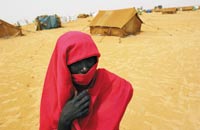 The season of Advent always invites me to contemplate many facets of Christianity: the contrast between what God extols versus the world's values, the power of patience, and the strength of hope. While important in all times and places, each of these themes can especially speak this year to the current situation in Sudan.
The season of Advent always invites me to contemplate many facets of Christianity: the contrast between what God extols versus the world's values, the power of patience, and the strength of hope. While important in all times and places, each of these themes can especially speak this year to the current situation in Sudan.
Sudan is preparing for an election in April 2010 that many predict could be catastrophic and could further strain divisions between the north and the south. Poverty, violence, and discord have raged throughout Sudan, and the evils of warfare have especially threatened the women and children. Sudanese President Omar al-Bashir has purposely encouraged rape as a weapon of war -- therefore allowing gender-based violence to spread throughout the country. As I reflect on the dire situation in Sudan, I am reminded of the angel Gabriel's visit to a peasant woman -- in a politically turbulent region -- named Mary.
Mary conceived Jesus in an impoverished village amid the backwaters of the oppressive Roman Empire. Mary was not a woman born into prestige and influence, and there is nothing about her that the world would naturally value. Yet the angel Gabriel calls THIS lady in the tiny village of Nazareth "favored one," and promises her that God is with her (Luke 1:28). Not only is the Lord with Mary, but God has also given this seemingly common peasant a voice that has lasted for centuries. Scripture records Mary's song of praise, or Magnificat, where she extols the Lord who "has brought down the powerful from their thrones, and lifted up the lowly" (Luke 1:52). God's glory shines here not in riches and splendor, but through the cries of a country woman whose enduring voice seeks justice.
God has also given the women of Sudan such a voice for all ears to hear. After fleeing violence in Darfur in 2003, thousands of Sudanese women have been forced to live in the Farchana refugee camp in the neighboring country of Chad. The conditions in the camp are woefully inadequate, and gender-based violence continually threatens the daily lives of the women there. Like Mary, they have nothing that the world would naturally value. Yet these ladies have also raised their voices to cry out for justice. They have chronicled their grievances and hopes for a better world in the Farchana Manifesto. God raised up Mary's voice 2,000 years ago, and we can be confident that our Lord is elevating the voices now of women in Sudan who are just like Mary. Cries for God's justice cannot be silenced, and may we pray that the God who lifts up the lowly will continue to lift up the voices of the women in the Farchana camp.
 Melanie Weldon-Soiset is a Policy and Organizing Associate at Sojourners and a third year Master of Divinity student at Wesley Theological Seminary.
Melanie Weldon-Soiset is a Policy and Organizing Associate at Sojourners and a third year Master of Divinity student at Wesley Theological Seminary.
Got something to say about what you're reading? We value your feedback!